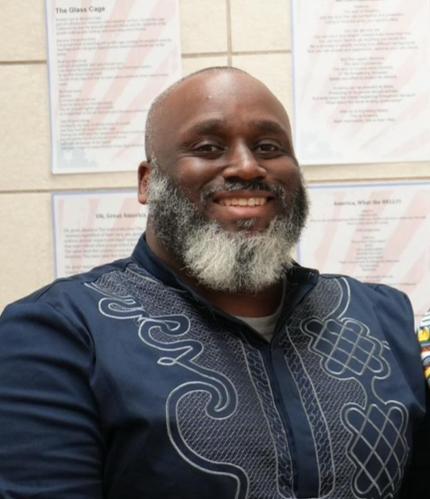October 23, 2025
“Unk” in the Classroom: Ronald Holmes on Education Equity and impact
By Nic Wong
By DJ Dehaney

In a society where teachers are paid so little, why choose that path? Ronald Holmes is an African American English and history teacher in the Bronx. He has been a teacher for over ten years, and when he chose this profession, money was the least of his concerns. During his childhood Mr. Holmes attended school in the Bronx, where he excelled academically but often found his way into trouble. Holmes says he has always had some “self-diagnosed ADHD,” stating that he often had trouble staying still and always had a lot of energy. “I was a bit of an unruly kid,” Holmes says. “The secretaries knew my parents by name.”
After moving to Long Island after elementary school, Holmes realized that though he excelled academically in the Bronx, “the type of education that those kids received in (Long Island) elementary schools was definitely at a higher level. So I felt myself needing to, in a sense, kind of catch up.” This realization highlighted a discrepancy in the quality of education available to students in low-income versus middle-class or higher-class communities. “For me the distinction in education unfortunately was clear when it came to math. I was probably two years behind in math when I moved, even though I was labeled as being in the “accelerated class.” It made me feel dumb for the first time in my life. I struggled to catch up.”
His experience adjusting to the difference in the quality of education in the Bronx and Long Island has played a major role in his work ethic. “Because of the lower expectations I received in elementary school, I try to make sure that that doesn’t happen now that I’m a teacher.” By having high expectations for all his students, Holmes pushes them to do their best academically. “I know that some teachers come and they work in the inner city, and they’re just kind of like, punch in, punch out, and they don’t put the same effort into their teaching. I feel like you have to teach in a way as if your own kids were in front of you,” said Holmes. Holmes calls for change, not in the curriculum but in the educators. “I think sticking to one curriculum is a silly practice; teachers should have the ability to pivot and adjust to what lessons are being taught based on their students. The curriculum isn’t always cookie cutter.”
Destiny Ohakam is one of Mr. Holmes’s former students; she had his English and history classes in her seventh and eighth grades of middle school. Though she is now a rising junior in high school, she still believes that the lessons Mr. Holmes taught her have made a lasting impact. “He was a very hands-on teacher and didn’t really play favorites; he gave everybody an opportunity to actually learn. Instead of just coddling a few people who were ahead, he made sure everyone was on top of their work,” said Ohakam.
In high school, Holmes, like many of his peers, was not sure what he wanted to pursue as a career. He was open to being an English teacher but “was never very passionate about any specific career.” And so he became a banker for many years; during this time Holmes was not pleased with how the industry treated poor people. He found it unethical how banks bombarded people with “crazy overdraft fees” when they were already struggling to make ends meet. Eventually, his friend recommended that he change his career to teaching. “I listened, and it was probably one of the best decisions I’ve ever made,” said Holmes. He added, “I don’t wake up and I’m like, ‘I got to go to work.’ I’m like, ‘All right, I got to go to work.’ What are we going to do today, you know? I find teaching to be a very, very fun experience for me.”
When asked what his favorite subjects to teach are, Holmes responded, “Definitely history as a whole, but the specific topic I like most is teaching about the plight of the African American in American society and the transition from the triangle slave trade to here, and especially what happened after African Americans were freed, all the things that happened in the Jim Crow era. And also how women are marginalized in American society.” Holmes says he finds it important to teach these subjects “just to keep that in mind so that we never go back in time. Because it was not fair. Equality is still not here, but at least it’s a little better than what it was.”
Holmes is known to go beyond the limitations of the curriculum to teach subjects that are pertinent to our history but are cast aside by the curriculum. “I go far more into depth and teach about more things than technically I’m supposed to because I think it’s important that students learn about it. Because it’s better to be as educated as you can before you make an opinion on anything,” said Holmes. Ohakam says, “My favorite lessons he taught were on the rape of Nanjing and the concept of laissez faire.” She also says, “In the end, even the little readings that we had to do in his class made me like a few books—like I did not know I was going to like poetry that much after being adamant that I hated poetry.”
Tianna Burrowes, another former student of Mr. Holmes, who similarly had him as a history and English teacher in seventh grade, notes, “What I like about him is that he was very involved and never gave up on students.” Holmes explained more about connection with his students, “I feel like when you have some type of more familial bond with your students, it’s just more impactful. You have a deeper connection, I think kids listen more.” Holmes said he has never reconsidered his decision to become a teacher but was at one point training for an administrative position where he worked on testing and professional development for teachers. Though this position would have given him the ability to address issues he saw in the quality of education, he says, “I realized during my time doing that that I didn’t find that enjoyable. I didn’t have connections with the students. Being removed from the classroom made me removed from the students in a way when it comes to academics.”
With most teachers, the extent of a student-teacher bond is asking students how your weekend was, referring to them as “Mr. or Ms.,” and upholding that professional boundary that leaves no room for playful banter. Holmes doesn’t uphold that professional barrier; he forms his own where banter is not only allowed but reciprocated. And yet students still maintain respect for him not just because he’s a teacher and an adult but because he is amazing at his job and goes above and beyond to display a genuine care for the academic and emotional well-being of his students. “I feel that kids teach me as much as I teach them. I’m smart enough to know that I don’t know everything and that they have their own stuff that’s happening. Even though I’m living in it, I’m still slightly removed from it because I’m an old head. Apparently now I’m an unk,”—one who wakes up in the morning and thinks, “ I got to get to work. What are we going to do today?”


